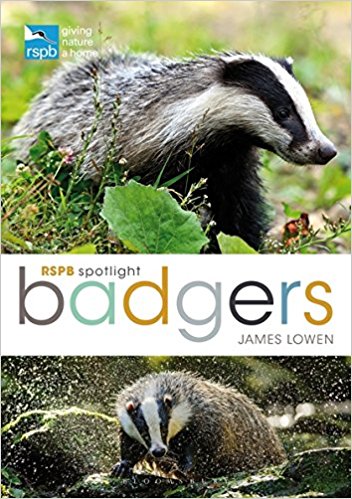Forestry
| RSPB Spotlight on Badgers book |
 |
James
Lowen explores the lives of badgers and their communal
living, feeding habits and threats to their conservation. Click
here to buy:
Paperback edition
Kindle edition
|
Under The Protection of Badgers Act 1992, a licence has to be obtained
before a badger sett
in a woodland area can be obstructed, damaged, destroyed or disturbed
during forestry operations. DEFRA (the people who issue some of the
licences) frequently consult with English Nature over the issuing of licences,
as they have considerable expertise in dealing
with badger problems.As Forestry operations involved the felling of
potentially large trees, there is the risk that falling timber might cause
enough of a ground shock or disturbance to cause collapse of the sett or
tunnels in and around it. For this reason, the Forestry Authority (and
English Nature) have produced a very useful guidance booklet which provides
a Code of Conduct for forestry operations. Following the advice does not
negate the need to get a badger licence if one is needed, but it does make
the circumstances in which a licence is needed that much clearer.
In any event, the intention should always be to protect
the badgers and their sett, irrespective of the fine nuances of any
legislative details. We would always recommend a cautionary approach for
forestry operations, leaving a very wide margin of error when doing things
like nearby tree felling and thinning. Remember that the exact effect of
ground shocks and heavy impacts on underground tunnels can't be known with
certainty. It is also as well to be aware that the badger may have chosen
their site because it provides the correct combination of outlook, shelter
and ventilation. Felling trees too close to the sett itself, may make the
sett too exposed for the badger's liking; and we would ask foresters to
remember that the badgers woodland habitat ought to be maintained wherever
feasible. A cleared hillside with a single, isolated clump of trees may
not be in the best interests of either the badgers or the forestry
operations either.
General
Most forestry operations can be
carried out without interference to badger setts provided they are
carefully planned and supervised.
Although it is not practicable,
desirable nor intended to make all setts 'no-go' areas for forestry
operations, the tree crop within the vicinity of setts should be managed
with sensitivity in order to minimise disturbance to the badgers.
For
this reason the whereabouts of all setts in the woodland should be
known. The ideal situation would be to designate the woodland around the
sett for indefinite retention in suitable wind firm sites, though with
appropriate thinning. If this is not practical in the first rotation,
then a broadleaved retention should be aimed at when planning the second
rotation. The supervisor should draw the attention of any workers to
the sett's presence/position and mark the boundary of an area within 20
metres of any sett entrance by ropes or secure coloured tapes. This is
particularly important when the work is carried out by contractors and
sub-contractors.
No forestry operations should take place within
the marked area during the breeding season i.e. between 1 December and
30 June. If it is not possible to avoid all operations in the
area during this period, increase the size of the protection
zone and avoid the periods around dusk and dawn.
Thinning
Where a sett is in a compartment
due for thinning, trees in the immediate vicinity of holes should not
be felled.
Trees should be felled to avoid falling across holes; and
logs should never be left across badger paths and
latrines.
All extraction equipment, skidding and racks should avoid the
marked sett area.
Fuel, oil
and chemical containers must not be used or stood in the marked area
around the sett or on badger paths or latrines.Allowing diesel,
petrol or any other petro-chemical or noxious substance to leak or spill
into a badger sett is a serious offence.
The only exception for the use of chemicals should be where stumps are treated against fungus or rot, when the relatively harmless
Urea-based chemicals may be used (whilst avoiding spillage or waste).
Clear felling
A 'tuft' of unfelled
trees left in the sett area may be exceptionally exposed to "wind
throw", with severe damage to any holes among their roots,
these trees should be cut off 1.0-1.5 metres above the ground.It
is often the case that the roofs of badger setts will be held up with
tree roots, so allow root systems to be vibrated by wind throw is asking
for trouble.
These
remaining stumps would
provide delineation markers of the sett area; and would be a strong
barrier to help prevent later
damage from machinery. In addition, they would provide a retention of some familiar surroundings for the
badgers as well as highly-desirable scratching posts. Retained bark
would provide dead wood
for insects and, if cut off higher, bird nesting sites or boxes.
New plantings
No burning, ploughing and scarifying
should be done within 20 metres of the sett.
No conifer planting should
be done in this protected area either, although some sensitive planting of
local broadleaved trees around the sett may be desirable.
ProsecutionsDamage to setts and deaths of
badgers by machinery during forestry operations is illegal; as it is
wholly feasible that a forester should and does know of the existence of
badger setts. In such cases, criminal prosecutions under The Protection of Badgers Act 1992
should be assumed to be inevitable.

| Legal Notice regarding the banning of
Renardine: |
| Renardine was the only legally permitted chemical deterrent which was
effective against badgers.
As from the 24th March 2005, Renardine has been banned.
Importantly, ALL the approvals for Renardine have now expired. This
means that: |
|
* Renardine can no longer be advertised for sale. |
|
* Renardine can not be bought from any shop, wholesaler, mail order,
agricultural supplies merchants, internet or by private sale. |
|
* Renardine may no longer be supplied, sold, given away or swapped. |
|
* Renardine may no longer by used. |
|
* Renardine may no longer be stored (so any stocks you have must be
disposed of). |
|
RenCoco
( Renardine-impregnated cocoa shells) has also been banned. |
|
For more information see the
PSD's web site at http://www.pesticides.gov.uk/approvals.asp?id=1567 |
|
